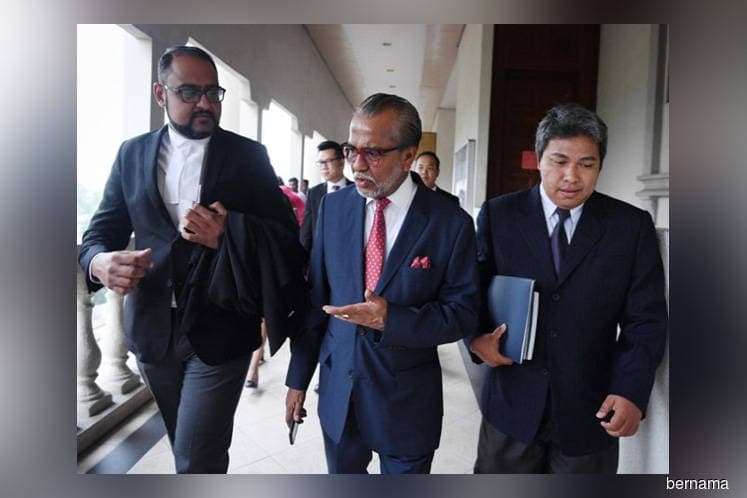
KUALA LUMPUR (Oct 25): Some RM1.855 billion implicated in two charges against former premier Datuk Seri Najib Razak and former Treasury sec-gen Tan Sri Mohd Irwan Serigar Abdullah were used to pay obligations to two mega infrastructure projects in the country.
Speaking to reporters after a court hearing on the two individuals today, Najib's lead attorney Tan Sri Mohammad Shafee Abdullah also said the practice of re-prioritising government funds is being practised "even today" by the present government.
Najib and Mohd Irwan were jointly slapped with six counts of criminal breach of trust (CBT) involving a sum of RM6.636 billion worth of government funds, including those slated for subsidy and cash assistance. Both pleaded not guilty at the KL Sessions Court.
"The first two charges [totalling RM1.855 billion] are related to infrastructure projects… ECRL (East Coast Rail Link) and gas pipeline projects," said Shafee.
Earlier in the Sessions Court, Shafee also explained that the RM4.781 billion mentioned in the four remaining charges was used to pay Abu Dhabi's sovereign wealth fund International Petroleum Investment Co (IPIC).
Malaysia's state-owned fund 1Malaysia Development Bhd (1MDB) borrowed US$1.2 billion from IPIC in 2015. The sum was repaid by 1MDB under a settlement agreement in 2017. 1MDB said at the time it raised the fund for the repayment via asset sales without elaborating.
Shafee said the duo decided to "relocate and reprioritise" the funds "together with various committees" considering the deadlines of the three obligations involved.
"If you have a deadline that will cost you a lot of money if you don't meet those deadlines because it will trigger a national default, the consequences are dire," he said.
"That does not mean the previous allocation is left vacant," he added. "It will be met subsequently… It is a matter of making priorities."
On ECRL and gas pipeline projects
The 688-km ECRL would have cost RM81 billion to develop, when including financing and other costs, according to Finance Minister Lim Guan Eng.
Lim previously stated that the Malaysian government through Malaysia Rail Link Sdn Bhd (MRL) has paid the ECRL's contractor China Communication Construction Co (CCCC) some RM19.68 billion for advanced payment and completed portions of the rail project.
The project, according to Najib, is fully financed via a 20-year loan from Export Import Bank of China (Exim Bank), with interest rate well below 5.5%.
The project is now under review, with negotiations still ongoing between CCCC and MRL.
Separately, two gas pipeline projects — namely the Melaka-Kedah Multi-Product Pipeline (MPP) and Trans-Sabah Gas Pipeline project (TSGP) — would cost the government a combined RM9.4 billion to fully develop.
The project is 85% financed via Exim Bank loans and 15% via government-guaranteed sukuk.
The government via the Finance Ministry's (MoF) unit Suria Strategic Energy Resources Sdn Bhd (SSER) paid 88% of the project cost to contractor China Petroleum Pipeline Bureau (CPPB), despite it being only 13% completed.
Mohd Irwan was also chairman of SSER. The two gas pipeline projects have been terminated by MoF.
Fund diversion an "executive decision" by Najib, Mohd Irwan
Shafee today described the action to divert the repayments as an "executive decision" by Najib and Mohd Irwan.
"These six charges relate, basically, to putting certain finances to prioritise their payment to something else which have taken over in terms of priority. It is an executive decision.
"These charges call into question executive decision-making process of [former] Minister of Finance [Najib Razak] and [former] sec-gen of the Ministry of Finance [Mohd Irwan]," he added.
When asked if the diversion of the funds by Najib and Mohd Irwan breached any procedures, Shafee said: "Not from my client's perspective. This has been done many, many times before, even today.
"At least two payments have been made by the current government to IPIC. So how did they meet the deadline?" questioned Shafee.
"If you don't meet the deadline by taking money that is available to meet the deadline, you will be blamed for being negligent… but [my client] made a management call and for that, he is being charged."